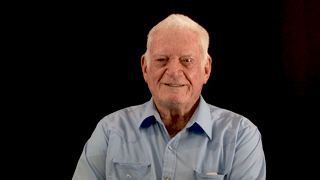5:24 | C.B. Skelton was studying to become a physician when he was drafted late in 1944. He was sent to Officer Candidate school, but while he was waiting, he was put in charge of quarters and had to solve a very difficult problem when a recruit was threatening suicide. After OCS, he was training for the invasion of Japan. (This interview made possible with the support of DONALD FAWCETT (Capt.) R)
Keywords : CB Skelton Camp Blanding Fort Benning Officer Candidate School (OCS) medical suicide Reserve Officer Training Corps (ROTC) Little Rock AR

Before new 2nd Lieutenant C.B. Skelton could ship out to the Pacific, the atomic bomb ended the war. He was reassigned to the Graves Registration Service and they trained him to investigate and deal with American bodies scattered across Europe. When he got there, he found an unbelievably dysfunctional unit. (This interview made possible with the support of DONALD FAWCETT (Capt.) R)
In post-war Europe, C.B. Skelton was a 19 year old 2nd Lieutenant working to identify and recover the missing remains of American servicemen. He was the Special Investigations Officer, which meant he got the difficult and unusual cases, like the possible spy and the gruesome casket with multiple bodies. (This interview made possible with the support of DONALD FAWCETT (Capt.) R)
C.B. Skelton was in a small Austrian town looking for the missing remains of a downed American flyer. It turned out that the town he needed was actually in Italy, so he had to set out alone through the Alps with a jeep and a trailer full of fuel. The road to the town got narrower and the drop on one side got deeper, but he forged ahead. He didn't know it, but he was about to make local history. (This interview made possible with the support of DONALD FAWCETT (Capt.) R)
The job was identification and retrieval of the remains of American servicemen which were scattered throughout Europe. C.B. Skelton, a future physician, was a young 2nd Lieutenant trying to get this done despite the gaps in information and the shortcomings of the unit's leadership. (This interview made possible with the support of DONALD FAWCETT (Capt.) R)
In post-war Austria, C.B. Skelton was an American officer working for the Graves Registration Service when he was sent inside the Russian zone to search for American graves. He was expecting to go to war with them at any minute, and was shadowed at all times by his Russian handler. Then, on the street, an Austrian civilian slipped him a note. (This interview made possible with the support of DONALD FAWCETT (Capt.) R)
He was in his final Army training when the war ended. C.B. Skelton, was then sent to Europe with the Graves Registration Service, where he found possibly the most disorganized unit in the Army. This was due in no small the part to the bad leadership of a series of commanding officers. (This interview made possible with the support of DONALD FAWCETT (Capt.) R)